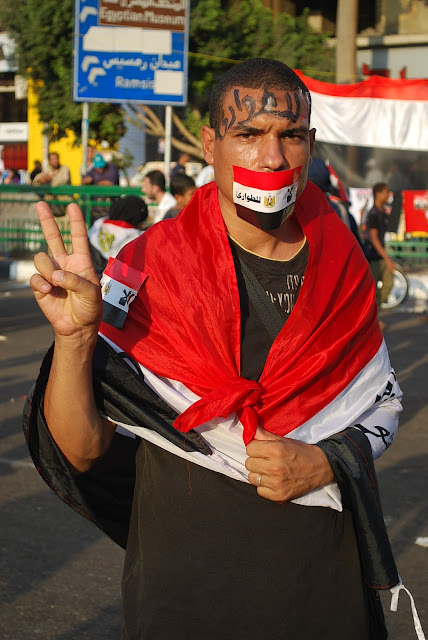My diary in Cairo where I'm producing a documentary about the summer of (post) revolution Egypt.
Monday, 31 October 2011
See No Evil Hear No Evil
Labels:
Egypt,
Graffiti,
Revolution,
Street Art,
Tahrir
Tuesday, 25 October 2011
The Caged Bird Sings of Freedom
Caged Bird
by Maya Angelou
A free bird leaps
on the back of the wind
and floats downstream
till the current ends
and dips his wing
in the orange sun rays
and dares to claim the sky.
But a bird that stalks
down his narrow cage
can seldom see through
his bars of rage
his wings are clipped and
his feet are tied
so he opens his throat to sing.
The caged bird sings
with a fearful trill
of things unknown
but longed for still
and his tune is heard
on the distant hill
for the caged bird
sings of freedom.
The free bird thinks of another breeze
and the trade winds soft through the sighing trees
and the fat worms waiting on a dawn bright lawn
and he names the sky his own
But a caged bird stands on the grave of dreams
his shadow shouts on a nightmare scream
his wings are clipped and his feet are tied
so he opens his throat to sing.
The caged bird sings
with a fearful trill
of things unknown
but longed for still
and his tune is heard
on the distant hill
for the caged bird
sings of freedom.
Thursday, 13 October 2011
A case of institutionalised sectarianism?
A week ago I remember thinking, why did they clear away the sit-in? This was a chance for the Coptic community to express its grievances. A few days later, a follow-up protest was organised by the Coptic community resulting in the tragic event of Sunday, a dark day in Egypt's new history.
But as a country in mourning faces a crisis, symptomatic of a deeper running problem, a positive dimension is transpiring. The issue of the unequal treatment of the Coptic community in Egypt is unquestionably becoming a part of the national debate and psyche.
Last Monday, I was watching an interview on ONTV featuring a seasoned journalist called Gamal El-Ghitani, in which he raised critical points. Why did we get to this? What is the problem with building a thousand churches? Why is it that some 600 years or so of Coptic history are not mentioned in Egyptian school books? Why is it that Copts can't reach certain positions in sensitive areas?
They're all questions which point at a structural problem in the system and lead me to ask if Egypt is suffering from institutionalised sectarianism against Copts. While I believe most Egyptians are tolerant and respectful of each other's faiths, the system is somehow enabling the unfair treatment of Copts. The issue can no longer be ignored.
As the political and intellectual elite of Egypt discuss the current crisis and status quo of the Coptic community, I have hope that the matter will seep down further to the masses resulting in a raising of consciousness. I also hope that it will lead to a conclusion where all Egyptians are treated fairly and with dignity in their country of birth, no matter what their religious beliefs. It's a principle that puts some of the fundamental values of Jan 25 to the test.
But as a country in mourning faces a crisis, symptomatic of a deeper running problem, a positive dimension is transpiring. The issue of the unequal treatment of the Coptic community in Egypt is unquestionably becoming a part of the national debate and psyche.
Last Monday, I was watching an interview on ONTV featuring a seasoned journalist called Gamal El-Ghitani, in which he raised critical points. Why did we get to this? What is the problem with building a thousand churches? Why is it that some 600 years or so of Coptic history are not mentioned in Egyptian school books? Why is it that Copts can't reach certain positions in sensitive areas?
They're all questions which point at a structural problem in the system and lead me to ask if Egypt is suffering from institutionalised sectarianism against Copts. While I believe most Egyptians are tolerant and respectful of each other's faiths, the system is somehow enabling the unfair treatment of Copts. The issue can no longer be ignored.
As the political and intellectual elite of Egypt discuss the current crisis and status quo of the Coptic community, I have hope that the matter will seep down further to the masses resulting in a raising of consciousness. I also hope that it will lead to a conclusion where all Egyptians are treated fairly and with dignity in their country of birth, no matter what their religious beliefs. It's a principle that puts some of the fundamental values of Jan 25 to the test.
Labels:
Copts,
Counter-Revolution,
Egypt,
Gamal El-Ghitani,
Jan 25,
Maspero,
Revolution,
Sectarianism
Tuesday, 4 October 2011
No to Emergency Law
Protesters were demanding an end to the recently activated emergency law in a protest called in Tahrir on Sep 16th, 2011.
 |
| 'No to Emergency' |
 |
| 'No to Emergency' |
 |
| Boy with Body Paint |
Labels:
Egypt,
Emergency Law,
Revolution,
Sep 16,
Tahrir
Subscribe to:
Posts (Atom)
